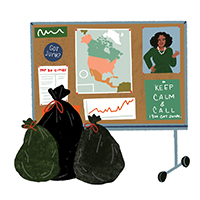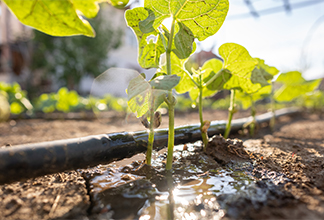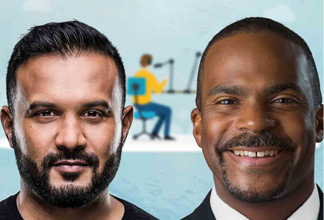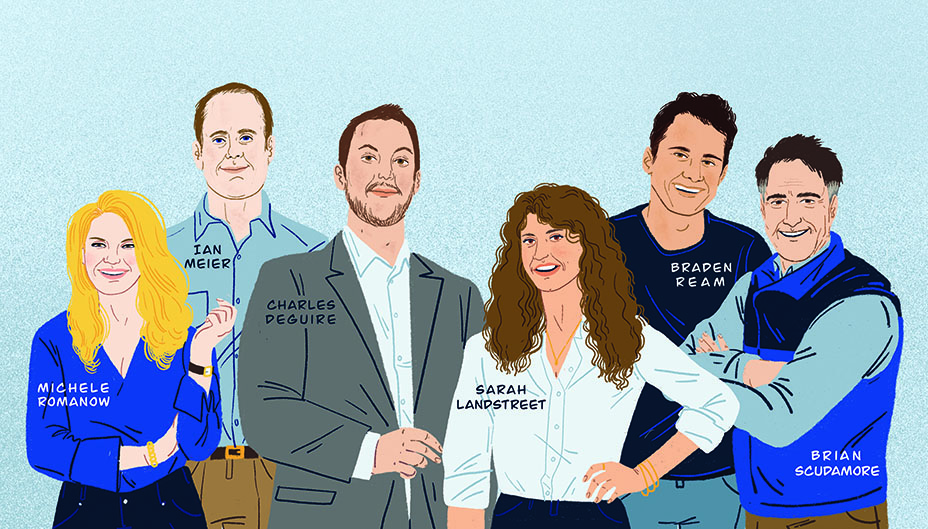Inside Six Innovative Minds
Written by Mary Levitski
Published on February 6, 2020
minute read
Share:
Entrepreneurs have a knack for seeing what others don't — because, well, it isn't there yet. Savvy investors often see what isn't there yet, too. But for all masters of agility, identifying potential opportunities is only the first step. How do they approach difficult questions and come up with the right answers? How do they look at failure? How do they go from ideation to innovation to sustained growth (in some cases, over and over again)? And, most pertinent for the rest of us, how can we apply some of these thought processes in our own day-to-day lives and maybe even in our approach to investing? We picked some of Canada's brilliant brains to find out.

MICHELE ROMANOW
Deconstruct Failure
Though she's widely known as a venture capitalist “Dragon” on CBC's Dragons' Den, Romanow is best described as a serial entrepreneur. Starting with a zero-consumer-waste coffee shop that she launched at Queen's University during her third year of engineering school, this powerhouse has gotten five businesses off the ground. In addition to Clearbanc, the AI-powered financing platform she cofounded in 2015, she's also a director on the boards of Whistler Blackcomb owner Vail Resorts and multinational restaurant chain Freshii. Oh, and that campus cafe still operates today.
On Inspiration
“I try to broaden my perspective. I listen to audiobooks. I think about the bigger trends in technology and how they're going to have big effects. And I cannot overestimate how much time I actually spend brainstorming. My favourite activity is to think about what companies and products the world needs. I spend dinners talking about this. I spend time at the bar talking about this. I spend my weekends thinking about this. But what's probably way more important than where you find ideas is really quickly executing on testing those ideas.”
"I prioritize ruthlessly. If I can only do three things today, which are the most important?" - Michele Romanow
On Taking a Leap
“No matter what, you always have to look at data. Because data will constantly surprise you. But the problem in a startup is that there's very little data. I always say, by the time McKinsey has written about an industry, the industry's been born. There are already multiple billion-dollar players. So when you enter a new space, you have to be willing to do that with extremely little data and pretty good gut intuition on what the future is going to be. And the most important thing when something doesn't feel right is not that you immediately U-turn; it's that you start pulling on those threads and asking a lot more questions to make sure that you're not being misled by your own data. Because if you're clever and you're smart, and if you're working with clever and smart people, you can make data tell almost any story you want.”
On Time Management
“I prioritize ruthlessly. When I'm overwhelmed, I sit at my desk with a sticky note and think, If I can only do three things today, which are the most important? And if you tell yourself you can only do three things, you'll actually do a lot more, but you'll really get the three hardest things, the three things that can actually move the needle, done.”
On Failure
“You need to deconstruct failure a little bit. Almost universally, it's not like everything doesn't work at once. And so what you're trying to figure out is what parts are working that you could double down or refocus on.”

IAN MEIER
Determine What's High Risk
Having been born and raised on a farm, Meier saw something no one else was talking about: The agricultural tech he had built and seen in the market was 20 years behind the latest consumer technology. Today, Meier and colleague Michael Lockerbie — both electrical engineers and computer scientists — are working to close that gap with their agtech brand, Agrimatics.
"I like to figure out what the highest-risk issues are. Where can this go wrong? What's the thing that we have the least comfort in being able to solve? Solve that first." - Ian Meier
On Problem Solving
“I like to figure out what the highest-risk issues are. Where can this go wrong? What's the thing that we have the least comfort in being able to solve? Solve that first. People often have a natural inclination to knock off a lot of the more straightforward things first because they feel like they're making progress. And they are making progress; however, it's all for naught if one of the critical issues is a no-go.”
On Keeping a Level Head
“I try to stay reasonably detached, on both the highs and the lows. When things are going really well, I try not to get carried away. I think about times that weren't as good to bring me back to earth. And when things aren't going well, I think about our wins, and that can help me feel less demoralized or despondent. Tomorrow is a new day, so I don't dwell on things too much. This way, I can be more objective.”
On Staying Sharp
“I read a lot. I'm a naturally curious person, so if something sounds interesting, I'll read up on how it works, whether it's related to our business or not. The side effect is that I might learn something that I can apply to the business, even though it seems completely unrelated. That's the interesting part of business: the multidisciplinary aspect, where ideas from all over the place can be combined in a new way.”

CHARLES DEGUIRE
Learn How to Learn
Three of Deguire's uncles were living with muscular dystrophy, so mobility and quality of life were often on his mind when he was growing up. While studying electrical engineering, he developed the vision for Kinova, a groundbreaking robotics company that he co-founded with Louis-Joseph L'Ecuyer in Boisbriand, Que. Their first product was an assistive arm called JACO, and Kinova won a Governor General's Innovation Award in 2016.
"Once we realized that we could do it, there was no reason not to jump in." - Charles Deguire
On Getting Started
“During my engineering degree, we were working on robotic projects, sending robots to space. Yet, my uncles didn't have a viable option to help them drink a glass of water. We just took the challenge. In a weekend, we were able to come up with a mock-up and simulation of something that looked viable. Once we realized that we could do it, there was no reason not to jump in.”
On Learning to Learn
“I was lucky to have had some great teachers along the way. A professor once told us, 'The only thing you're really going to learn here is how to learn. If you succeed in doing that, everything else will follow.' So when we had to learn about electrical engineering or robotics, we learned it with a systematic approach and by working with experts. We then did the same thing with market development, international business development and contract negotiation.”
On Diversifying
“We robotize tasks. We did that for people using wheelchairs, expanding their reach. In surgery, we expand the capabilities of the surgeon. In hazardous material handling, we robotized the manipulation of toxic or nuclear waste. But it's always the same process, providing better tools to humans.”
On Problem Solving
“We move problems through a funnel. We start very wide, sort of chaotic. We look internally and externally, within our own industry and other industries, and ask, What process can I use to solve this? Once we've selected a few approaches that we believe have potential, we drill down and get really focused on executing each of them.”

SARAH LANDSTREET
Solve Problems Not Everyone Would Know About
This queen of the pivot trained as a mechanical engineer, opened the first cupcake bakery in Northern Ireland, turned a profit and sold her business. Next, she got her MBA and founded Georgette Packaging, a carbon-neutral packaging firm in Kitchener, Ont., that's now among the fastest-growing businesses in Canada. And she did it all before her 30th birthday.
"I'm interested in problems that not everybody would necessarily know about. I like kind of unsexy industries." - Sarah Landstreet
On Identifying a Niche
“I'm interested in problems that not everybody would necessarily know about. I like kind of unsexy industries, I guess. Most people wouldn't know how tricky it is to buy packaging as a food business, for example, unless you happen to own a food business. But at that point, you're busy running your food business; you're not in the packaging industry.”
On Making Mistakes
“I think that business owners in general are not lacking intelligence, but they are often lacking in compassion for themselves. Because you'll never have enough information to know exactly what to do. You can't predict the future. I'm pretty good at rebounding from mistakes, not focusing on them too much, and doing what it takes to fix the situation. I feel like those skills are just as important. Mistakes let me flex my resourceful muscles.”
On Productivity Hacks
“I like putting systems in place that force me to change my behaviour. I was reading about how the founder of IKEA removed the snooze button from his alarm. I love that. I recently got a landline – a rotary phone, so it doesn't even have voice mail – to encourage me to use my cell phone less. I always feel like cell phones are like Tamagotchi. It's like a pet that just gives you so much work.”

BRADEN REAM
Persist in Your Efforts
This young self-professed computer nerd is a business school dropout — and also the CEO of Voiceflow, a collaborative design platform for making voice apps. Ream and his co-founders (Andrew Lawrence, Michael Hood and Tyler Han) essentially built the tool they wished they'd had as app developers. Now, Voiceflow powers over 10 million conversations per month for users such as the New York Times.
On Decision-Making
“If you boil everything down, in every decision there's asymmetry. When it came to dropping out of school, there was actually not much of a downside. The downside was protected in that we could always go back. Inversely, the potential upside was unlimited.”
"If you look at an iceberg, the top 10 per cent is the tip that people see. There's an order of magnitude of time before people hear of that person, when they were just grinding away." - Braden Ream
On Success
“If you look at an iceberg, the top 10 per cent is the tip that people see. They see the funding headlines. They think the company's start date is when the entrepreneur started. Generally speaking, I think there's an order of magnitude of time before people ever hear of that person, when they were just grinding away, perfecting their craft.”
On Adaptability
“Entrepreneurship is about the persistence of effort, not persistence of ideas. At first, we were trying to build an entertainment app, but it was really expensive, and we were running out of money. We needed to scale the business, so we opened the tools that we had built internally to allow other people to build entertainment. But they weren't just building entertainment; these tools proved powerful enough for people to build anything they wanted. The light bulb went off: This business doesn't just have to be about entertainment. That shifted our whole mindset, allowing us to broaden our scope.”

BRIAN SCUDAMORE
Take Failure as a Gift
Vancouver-based Scudamore has been “failing upwards” for over 30 years on what he deems to be the roller coaster of trial and error of entrepreneurship. With 1-800-GOT-JUNK?, Scudamore got the formula right, and he's applied it to three more home-service brands under his banner company, O2E Brands.
On Failure
“I have story after story of failure: dropping out of high school, dropping out of college, telling my father — a liver transplant surgeon — that I was leaving school to become a full-time junk man. And I've made mistakes. I once hired the wrong COO, and we almost bankrupted the company. I once fired 11 employees, my entire staff, because I had hired the wrong people. Every single failure has become a gift. While it was a painful experience to go through, failure was the best education I could have. Even today, as a $345-million company, we have things that are not going to go as planned, but you tweak, you learn and continue to thrive.”
On Trusting Experts
“I love naysayers. I want to hear my staff say, 'No, Brian, this is crazy. This is not going to work. This is a bad idea.' Then I get to ask them questions. 'What would make it a good idea? How would you do it differently? What's missing? You're the expert.' Because I'm not the smartest person in the room. I never will be.”
"I started to understand the power of taking a picture from my mind and then sharing it with people around me." - Brian Scudamore
On Having a Vision
“Eight years into the business, I was having a bit of a doom loop in my life. I had gotten the business to $1 million. But I thought, Can it be bigger? I took out this one page, double-sided, and I started to write a letter to myself of what the future looked like for 1-800-GOT-JUNK?. I said we'd be on The Oprah Winfrey Show, we'd be the FedEx of junk removal, we'd be in the top 30 cities in North America. Within five years, all of those things happened. I started to understand the power of taking a picture from my mind, putting it into a document that isn't allowed to change, and then sharing it with people around me.”
Get more stories on entrepreneurship, leadership and digital technology in the RBC Disruptors Podcast.
This article was featured in our special issue, as seen in the Globe and Mail. Download the full magazine HERE.
RBC Direct Investing Inc. and Royal Bank of Canada are separate corporate entities which are affiliated. RBC Direct Investing Inc. is a wholly owned subsidiary of Royal Bank of Canada and is a Member of the Canadian Investment Regulatory Organization and the Canadian Investor Protection Fund. Royal Bank of Canada and certain of its issuers are related to RBC Direct Investing Inc. RBC Direct Investing Inc. does not provide investment advice or recommendations regarding the purchase or sale of any securities. Investors are responsible for their own investment decisions. RBC Direct Investing is a business name used by RBC Direct Investing Inc. ® / ™ Trademark(s) of Royal Bank of Canada. RBC and Royal Bank are registered trademarks of Royal Bank of Canada. Used under licence.
© Royal Bank of Canada 2025.
Any information, opinions or views provided in this document, including hyperlinks to the RBC Direct Investing Inc. website or the websites of its affiliates or third parties, are for your general information only, and are not intended to provide legal, investment, financial, accounting, tax or other professional advice. While information presented is believed to be factual and current, its accuracy is not guaranteed and it should not be regarded as a complete analysis of the subjects discussed. All expressions of opinion reflect the judgment of the author(s) as of the date of publication and are subject to change. No endorsement of any third parties or their advice, opinions, information, products or services is expressly given or implied by RBC Direct Investing Inc. or its affiliates. You should consult with your advisor before taking any action based upon the information contained in this document.
Furthermore, the products, services and securities referred to in this publication are only available in Canada and other jurisdictions where they may be legally offered for sale. Information available on the RBC Direct Investing website is intended for access by residents of Canada only, and should not be accessed from any jurisdiction outside Canada.
Explore More

How Soil Carbon Can Become Canadian Farmers' Next Cash Crop
Sustainable practices may mean untapped profits for Canadian farmers, says RBC Economics and Thought Leadership.
minute read

Hitting Net-Zero Means Rethinking How Canada Grows (and Buys and Eats) Food
Top takeaways from a discussion about the climate challenges and solutions that can be found in farming.
minute read

Diversity in Tech: "I Think This Is the Time," Says Lightspeed CEO
Key takeaways from a conversation on Black representation in a recent episode of Disruptors, an RBC podcast.
minute read
Inspired Investor brings you personal stories, timely information and expert insights to empower your investment decisions. Visit About Us to find out more.







